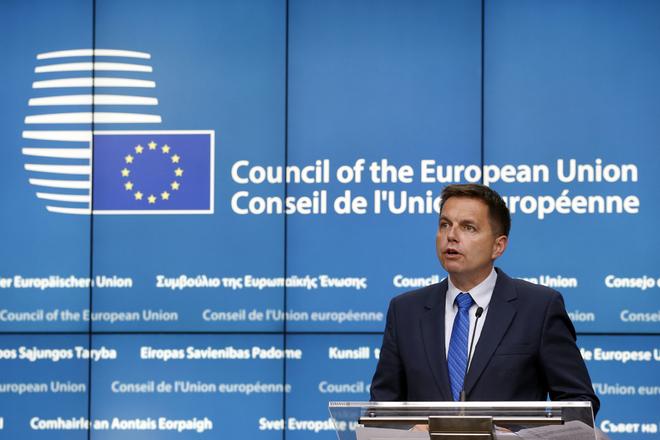Slovakia is finding success in fighting tax evasion – but at this time only on the European level. The country’s Finance Ministry points to several initiatives that were pushed through during its six-month presidency over the EU Council. Observers welcome the new measures, but say it will be important to see how they will be applied in practice.
“No significant measures targeting tax evasion were adopted in Slovakia in 2016,” Miriam Galandová, deputy chair of the Slovak Chamber of Tax Advisors, told The Slovak Spectator.
Reasons for this may include Slovakia’s presidency, and the fact that Finance Ministry employees worked on completion of the Anti-Tax Avoidance Directive (ATAD).
“We can expect more significant changes in the coming years when the rules arising from ATAD will be implemented,” Galandová added.
Fighting tax avoidance
The EU Ecofin Council agreed on the ATAD in July 2016. It addresses situations where corporate groups take advantage of disparities between national tax systems in order to reduce their overall tax liability.
It aims to set a minimum standard of anti-abuse rules in five areas: interest deduction, exit taxation, a general anti-abuse rule, controlled foreign companies and hybrid mismatches, according to the EU Council website.
“The advantage of this coordinated approach on the EU level is that such rules will be applied in all EU countries so the owners of shell companies will not escape it if they move to another member state,” Alexandra Gogová, spokesperson for the Finance Ministry, told The Slovak Spectator.
Slovakia needs to implement the new rules by the end of 2018, while they are expected to become effective in 2019.
During Slovakia’s presidency, the EU also adopted steps towards creating the first EU common list of non-cooperative tax jurisdictions. Based on this, the EU will launch discussions with countries that do not meet the criteria. Jurisdictions that reject any kind of cooperation and fail to meet the criteria will appear on a so-called blacklist, Gogová explained.
With this measure, the EU seeks to target mostly tax havens. The countries, however, do not have to necessarily end up on the blacklist.
“Conversely, for Slovakia and the EU it is better if such off-shore jurisdiction promises to exchange information about bank accounts and their real owners, either if they belong to the shell company or their go-betweens,” Gogová added.
Enforcement important
Moreover, the regulation on administrative cooperation was revised during the presidency, which should enable tax authorities to access information to fight money laundering. Part of it will also be information about beneficial owners and in-depth scrutiny of clients of financial institutions, according to Gogová.
Another novelty adopted on the EU level is the exchange of information within the so-called country by country reports, in which multinational companies must report important information about their subsidiaries, including those established in off-shore jurisdictions, Gogová said.
Observers have welcomed the measures, but stress it will be necessary to see how they will be put into practice.
“Without proper use of these measures, it will be another available tool but will not contribute to decreasing tax evasion,” Galandová said.
Róbert Chovanculiak, analyst with the INESS think tank, however, says that the fight against tax havens should not be based on closing the doors in front of them. The countries should rather “remove motivation of entrepreneurs to seek these tax jurisdictions”, he added.
Reverse charge discussed
Shortly before the end of Slovakia’s presidency, the EC put forward a proposal with the aim to enable member states to apply a different VAT system to the rules currently in force across the EU, under certain conditions.
The optional general reserve charge mechanism should enable EU countries to temporarily apply a system which derogates from the current fractionated payment of VAT. Sales between businesses of more than €10,000 could be invoiced free of VAT, with only the final consumer being liable for the full VAT costs, the EC informed.
“This proposal comes at the request of certain member states who argue that such a mechanism would help to put an end to a specific type of cross-border tax fraud known as carousel fraud which involves goods being sold back and forth between businesses in different countries,” the EC explained on its website.
Though the ministry considers the reverse charge mechanism to have potential to fight tax fraud effectively, it disagrees with the conditions introduced in the proposal, saying they “are difficult to implement in practice”.
“It is necessary to set the conditions in a way they can be used in practice,” Gogová stressed. The proposal, however, can serve as a good basis for discussion, Finance Minister Peter Kažimír said in late January 2017.
“The measure has the potential to curb space for VAT evasions, but its enforcement should be preceded by in-depth analysis which would confirm that such fundamental change would help achieve the expected goals,” Galandová said.
Problems remain
VAT evasion still belongs among the biggest problems across the EU as well as in Slovakia. Though the situation has been improving, the biggest cases of tax evasion remain undetected and unpunished, said Peter Kremský, executive director of the Business Alliance of Slovakia. One may suspect political support behind them, he added.
“The state should have done more to secure clarifying and punishing the big cases, which may discourage fraudsters,” Kremský told The Slovak Spectator.
Moreover, statistics suggest that the VAT gap is still big in Slovakia, while the oversight of income tax is minimal. The tax authorities do not compare increases in property with the taxable incomes of taxpayers, which could be an interesting source of information for identifying tax evasion, according to Galandová.
“To sum it up, the laws are not the worst, but their implementation in practice fails,” she added.



 Finance Minister Peter Kažimír (source: AP/TASR)
Finance Minister Peter Kažimír (source: AP/TASR)